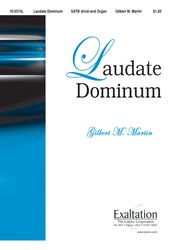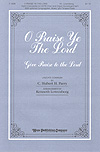- |
User Links
LAUDATE DOMINUM (Parry)

LAUDATE DOMINUM (Parry)
Composer: C. Hubert H. Parry (1894)Published in 87 hymnals
Printable scores: PDF, MusicXML
Audio files: MIDI, Recording
Composer: C. Hubert H. Parry
 Charles Hubert Hastings Parry KnBch/Brnt BMus United Kingdom 1848-1918. Born at Richmond Hill, Bournemouth, England, son of a wealthy director of the East India Company (also a painter, piano and horn musician, and art collector). His mother died of consumption shortly after his birth. His father remarried when he was three, and his stepmother favored her own children over her stepchildren, so he and two siblings were sometimes left out. He attended a preparatory school in Malvern, then at Twyford in Hampshire. He studied music from 1856-58 and became a pianist and composer. His musical interest was encouraged by the headmaster and by two organists. He gained an enduring love for Bach’s music from S S Wesley and took piano and harm… Go to person page >
Charles Hubert Hastings Parry KnBch/Brnt BMus United Kingdom 1848-1918. Born at Richmond Hill, Bournemouth, England, son of a wealthy director of the East India Company (also a painter, piano and horn musician, and art collector). His mother died of consumption shortly after his birth. His father remarried when he was three, and his stepmother favored her own children over her stepchildren, so he and two siblings were sometimes left out. He attended a preparatory school in Malvern, then at Twyford in Hampshire. He studied music from 1856-58 and became a pianist and composer. His musical interest was encouraged by the headmaster and by two organists. He gained an enduring love for Bach’s music from S S Wesley and took piano and harm… Go to person page >Tune Information
| Title: | LAUDATE DOMINUM (Parry) |
| Composer: | C. Hubert H. Parry (1894) |
| Meter: | 10.10.11.11 |
| Incipit: | 53125 16543 53251 |
| Key: | A♭ Major/B♭ Major |
| Copyright: | Public Domain |
Texts
Sing Praise to the LordYe Servants of God, Your Master Proclaim
You servants of God, your Master proclaim,
and publish abroad his wonderful name;
the name all-victorious of Jesus extol;
his kingdom is glorious and rules over all.
Alternative Tunes
Notes
LAUDATE DOMINUM (Latin words for the opening phrase of Psalm 150) comes from the end of the anthem "Hear My Words, O Ye People" by C. Hubert H. Parry (PHH 145), an anthem he composed in 1894 for a festival of the Salisbury Diocesan Choral Association. Parry's tune was set to Baker's text in the 1916 Supplement of Hymns Ancient and Modern, replacing an earlier LAUDATE DOMINUM by Henry J. Gauntlett for Baker's text. Parry's tune is an inspired melody from a great tune writer who rarely came to church but who produced some of the best hymn tunes in the later Victorian era.
Sing this noble tune with vigor and excitement; accompany it on the organ with a full registration and a touch of marcato. Sing stanza 1 in unison, stanzas 2 and 3 in parts (possibly one of them unaccompanied), and stanza 4 in unison again. For a real treat use Parry's majestic alternate harmonization with a "walking bass" on the final stanza; that harmonization is found in The Hymnal 1982 (432) and requires a slower tempo (half note = 88).
--Psalter Hymnal Handbook, 1988
Timeline
Arrangements
Harmonizations, Introductions, Descants, Intonations
|
Harmonizations, Introductions, Descants, Intonations: Piano and Organ Duet
|
Organ Solo
|
Piano and Organ Duet
|
Voices: Organ, Instruments and Voices
|
Voices: SATB and Organ
|
Voices: SATB, Organ, and Trumpet
|
Media
Christian Classics Ethereal Hymnary #659
The Cyber Hymnal #6089
Text: Sing Praise to the Lord!Psalter Hymnal (Gray) #466
Text: Sing Praise to the Lord- MIDI file from Christian Classics Ethereal Hymnary #659
- MIDI file from Christian Classics Ethereal Hymnary #659
- MIDI file from The Cyber Hymnal #6089
- Audio recording from Evangelical Lutheran Worship #418
- Audio recording from Glory to God: the Presbyterian Hymnal #550
- Audio recording from Lift Up Your Hearts: psalms, hymns, and spiritual songs #566
- Audio recording from Lift Up Your Hearts: psalms, hymns, and spiritual songs #566
- Audio recording from Lift Up Your Hearts: psalms, hymns, and spiritual songs #566
- MIDI file from Psalter Hymnal (Gray) #466
- MIDI file from Psalter Hymnal (Gray) #466
- Audio recording from Small Church Music #532
- Audio recording from Small Church Music #532


 My Starred Hymns
My Starred Hymns





